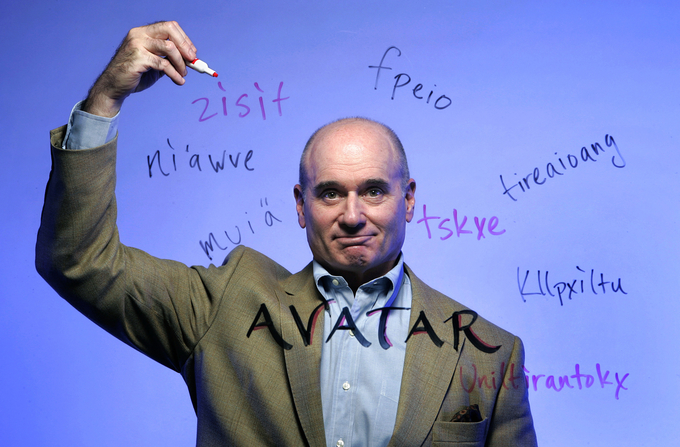May 20, 2025 | 00:23 GMT +7
May 20, 2025 | 00:23 GMT +7
Hotline: 0913.378.918
May 20, 2025 | 00:23 GMT +7
Hotline: 0913.378.918
Editor’s notes: When this interview was done, Dr. Paul Frommer was a lecturer at Marshall School of Business, University of Southern California. He went to California State University, Fullerton to present his presentation about the language in Avatar 1. We would like to share some interesting facts about the language of a hit movie that is hitting theaters around the world.

Dr. Paul Frommer.
How were you contacted and how did you come to work on Avatar?
In the summer of 2005, James Cameron's production company, Lightstorm Entertainment, sent an e-mail to the linguistics department at the University of Southern California, asking for a linguist who could develop an alien language. have my Ph.D. through that department but have not been connected to it for many years; at the time was teaching in USC's Marshall School of Business. Fortunately, a close friend and colleague who's part of the linguistics department, Dr. Edward Finegan, saw the e-mail and forwarded it to me and I jumped on it. I expressed my strong interest in the project and sent Cameron a copy of the linguistics workbook I had co-authored with Dr. Finegan, Looking at Languages: A Workbook in Elementary Linguistics. A week or two later I was called in for an interview. I spent 90 minutes with Cameron in his offices in Santa Monica, California, where we discussed his vision for the movie and the language. I found him extremely engaging, and enjoyed our wide-ranging and stimulating conversation very much. At the end, was thrilled when Jim shook my hand and said, "Welcome aboard."
Who is the first person who had the idea of creating a new language for this science fiction film?
I'm sure that was James Cameron himself!
In order to complete this project, what kind of linguistic theory did you use?
I didn't rely on any particular linguistic theory. There were, however, two important constraints that guided me. First, Cameron didn't want any electronic modification of the actors' voices, which meant that Na'vi had to be a language pronounceable by humans. Second, since according to the script some humans had learned to speak the language, Na'vi had to be a language that humans could actually learn.
What world languages provide the basis for Na'vi?
Na'vi isn't based on any particular language. It has, however, been influenced by some existing human languages. For example, some of the original vocabulary that James Cameron had come up with about 30 words sounded somewhat Polynesian, akin to words in Hawaiian or Maori. So that was where I started in creating the sound system. The ejectives I added are found in certain indigenous languages of the western hemisphere (e.g. Quechua), Africa (eg Amharic), and Asia (eg, the Caucasian family). Certain grammatical structures in Na'vi were inspired by various languages. For example, there's a verbal construction that looks a bit like something in Persian; there's a phonological rule that brings to mind similar processes in Hebrew and Irish; the case system is similar to one found in the Australian language Wanggumara. But the particular combination of structures and processes in Na'vi is unique.
The sounds of Na’vi are so nice. What is the basis of the phonology of Na'vi?
Well, for the phonetics and phonology didn't start from absolute zero, since James Cameron had incluđe about 30 words (including the name Na’vi itself) in the original script. These were mostly names of characters, animals, but they gave me a sense of the kinds of sounds he had in his mind. As I mentioned, my initial impresion was that those few words sounded somewhat Polynesian. So that was where I started in creating the sound system. I added some interesting sounds, like the ejectives which I transcribed as px, tx, kx; these are sounds produced with air from the glottis rather than from the lungs) and combinations of sounds, and excluded some familiar sounds (for example, the voiced stops b, d. g. and the fricatives and affricates we write in English as ch, sh, and th) as well. When Cameron approved the sound of the language as I developed it, I then determined the phonotactic constraints and the phonological rules, including a lenition process that alters or mutates certain initial consonant of roots under various conditions.
I provided the seven major actors who spoke Na'vi in the film with the written translations and a pronunciation key, but I also constructed sound recordings-mp3's-which they could download to their iPods and listen to. And of course I met with all of them individually, weeks before a particular scene was to be shot, to work with them on the pronunciation. They all strove to pronounce their lines accurately and convincingly. I think they did a remarkable job.

Two main actor and actress in the "Avatar - The way of water".
What is the basis of the vocabulary of Na'vi?
For the vocabulary, it was not a question of taking words from existing languages but of coming up with entirely new words that followed the rules of the Na'vi. In this I was guided by the script, developing the vocabulary on an as-needed basis. That is, the words I coined first were the ones I needed to translate the lines of Na'vi dialogue in the movie. Since Avatar came out, the Na'vi vocabulary has continued to expand. I myself am coming up with new words, and some of the fans' suggestions are terrific. The important thing to keep in mind is that there's already a "Na'vi community" out there, with bright, dedicated people who are helping the language grow. So although I am still the arbiter and judge who determines what's officially "in" the language, I'm no longer the only one contributing to its development-and that's a nice feeling!
What is the basis of the grammar of Na'vi?
Na'vi is not based on any existing language, but I can give you some highlights of its grammar. Inflectional morphology for verbs is achieved entirely through a system of infixes, which encode information about tense, aspect, and speaker attitude. Nouns and pronouns are inflected for case, the system is "tripartite," where there are separate cases for subjects of transitive verbs (agents), subjects of intransitive verbs, and objects (patients). Word order is unusually flexible: any of the six permutations of S. V, and O is grammatical, and adpositions (words that function as both prepositions and postpositions) can either precede or follow their heads.
Na'vi is so well developed that many fans continue to learn and practice it. Can you tell me more about these people and their activities?
Since Avatar was released, a worldwide community of Na'vi enthusiasts who are learning the language has emerged. The fan-created web site learnnavi.org is the main meeting place online, its forums, in 19 languages, currently have a total of over 460,000 posts. I've met some of these people in person at Na'vi gatherings and have spoken to more of them online: they're a wonderful group-bright, enthusiastic, and inventive. Some of them are extremely sophisticated linguistically, with extensive experience in foreign languages; others have developed an interest in language through Na'vi.
As a result of my connection with the film, I've met fascinating people I never dreamed of meeting. I've been invited to speak about my experiences across the U.S. and abroad, and I've achieved the kind of recognition I never expected to have. Plus I've made wonderful new friends in the Na'vi community. I consider myself extraordinarily fortunate to have been a part of Avatar.

A scene in the "Avatar - The way of water".
Some of these fans, I think, simply find learning Na'vi an interesting and challenging intellectual activity. But of course if Na'vi were not linked to Avatar, the interest wouldn't be a fraction of what it is. People have been so captivated by the world Jim Cameron create that they want to return again and again to Pandora. Unfortunately none of us can stay in that world for long (there's only so many times you can see the movie!), but one way of keeping a connection to it is to study and use the language that's spoken there. That, I think, is a large part of why Na'vi is popular.
In your opinion, what is the future of Na'vi? Do you think the language can step out of the film to become used internationally for communication?
Well, I'm not sure what the future holds, but right now there are already people who are using Na'vi on a regular basis for genuine communication. I often receive e-mails written entirely in the language, and there's at least one blog that's exclusively in Na'vi.
There are many invented languages in the world, among the most common of which is Esperanto. In your point of view, what are the differences and the similarities between Esperanto and Na'vi?
Esperanto is the most successful of all invented languages. Although it never achieved the dream of its creator to become a universal auxiliary language, there are avid Esperantists all over the world, including some native speakers! If Na'vi ever approached that level, I'd be delighted-and surprised. Other than the fact that they're both constructed languages used by some people as auxiliary means of communication, Esperanto and Na'vi have little in common. For one thing, Esperanto's vocabulary is mostly European-based, with strong connections to the Romance and Slavic families; Na'vi vocabulary, with the exception of a few borrowings for items not found on Pandora, is entirely new. Also, Esperanto was deliberately constructed to be simple and easy to learn; Na'vi can be quite complicated. Perhaps the biggest difference is that Na'vi reflects the alien environment and culture in which it originated, with words for the animals, plants, objects, and experiences found on Pandora; Esperanto is very much a human language.
While working with James Cameron, how do you feel?
Aside from being a cinematic genius, James Cameron has wide-ranging interests, including linguistic ones. We had some stimulating discussions about Na'vi, especially early on. There's no question he knows what he wants and makes sure he gets it, but our relationship was always cordial. I enjoyed working with him very much.
Thank you very much!

(VAN) This was the assessment shared by experts at the workshop titled 'Assessing the Role and Potential of Low-Emission Rice Production Systems in Vietnam,' held on the morning of May 19.

(VAN) Cai Rong Port is the fisheries control center of Quang Ninh, helping to monitor fishing vessels, combat IUU fishing, and remove the EC's 'yellow card'.

(VAN) The German Agricultural Society (DLG) explores the possibility of establishing a mechanization service center in Vietnam’s Mekong Delta to support farmers in accessing and utilizing advanced machinery.

(VAN) On May 16, the Department of Water Resources Management, in collaboration with the Food and Agriculture Organization of the United Nations (FAO), held a signing ceremony for the GEF-8 project document.

(VAN) Food safety, mechanization, vocational training, and market opening are key areas of cooperation expected between the Vietnamese Government and the Federal Republic of Germany.

(VAN) Deputy Minister Nguyen Quoc Tri also expressed his hope that Cuba will soon overcome its current challenges, attain food security, and further expand cooperation with Vietnam.

(VAN) The project contributes to enhancing the resilience of communities vulnerable to the impacts of climate change, with a primary focus on local women.